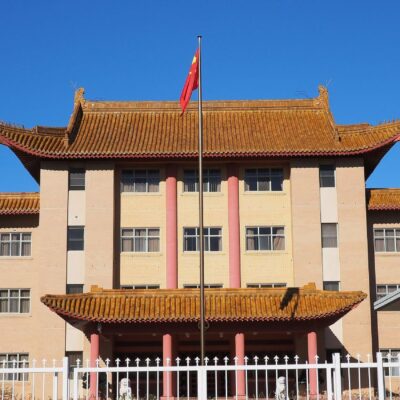US-China strategic competition has intensified in recent years. China has continued to expand its military capabilities and the US has responded with increased security cooperation with allies such as Japan, Australia, the UK, and Germany. In addition, the Taiwan Strait again became a flashpoint due to concerns relating to China possibly taking actions to ‘unify’ with Taiwan by force. All these trends would seem to destabilise the current regional order of the Indo-Pacific.
It is vital, therefore, to understand how Chinese policymakers and analysts view the regional order, whether one agrees with them or not. How do they assess China’s national power and its future trajectory in comparison with the United States? How do the Chinese foreign policy elites view the changing trend of regional order, and why do they see it that way?
This article aims to explain China’s internal view of the regional order in the Indo-Pacific region and discuss its strategic implications. It investigates key statements of China’s President Xi Jinping and explores additional insights from Chinese analysts’ writings published in Chinese. Due to censorship, public discourse in China does not reflect the diversity of opinion among Chinese scholars. Its significance is that, according to Alice Miller, a renowned expert on Chinese politics, one may reason backwards by examining the content of public discourse and infer the political purposes of the regime because the discourse will reflect the regime’s purposes. In other words, Chinese civilian publications can serve as a window into the internal view of the Chinese Communist Party (CCP), precisely because they pass censorship as consistently reflecting the party’s perspectives. While this article does not claim a broad survey of diverse opinions that might exist within China, it certainly presents the mainstream view that flows from the party’s perception of the world.
I find that Chinese leaders and analysts publicly express confidence about the future of China and that it will prevail in its rivalry with the United States. They express the view that American power is in decline and that this is the reason the US government, whether Republican or Democrat, is determined to contain the rise of China. The optimism about China’s rise and the conviction of American decline is in stark contrast with some American scholars’ recent assessment that China’s power will soon be in decline and that Chinese elites are anxious about it.
The perceptional gap between Chinese and American analysts is likely to further destabilise the regional order of the Indo-Pacific. If it is true that Chinese leaders are overestimating China’s national power and its future growth potential, they will be the first ones to be surprised by any crisis and it remains highly uncertain how they would react to it.
China’s view of China’s rise and American decline
The notion that China is rising and the US is declining began to emerge within China when the global financial crisis in 2008 hit the US and European economies particularly hard. In the same year, Chinese citizens were ready to celebrate the long-awaited Beijing Olympics with much excitement. What they had not expected to see was the collapse of Western financial systems. Chinese leaders such as Wen Jiabao, the former premier of China, emphasised that European leaders asked for China’s help to solve Europe’s debt crisis and Chinese scholars began to talk about ‘power transition’ theory. They expressed belief that, in combination with challenges in the Middle East such as the civil war in Syria and terrorism in Afghanistan and Iraq, the global financial crisis had hastened the US’ decline. Chinese analysts argued that American leaders recognised this decline and therefore began to focus efforts on undermining China’s rise. Peking University professor Jia Qingguo has argued that China was merely focusing on developing its economy, but it is the American perception of China that has changed from being a business partner to a security threat. Such a belief was hardened after Donald Trump took office in 2017.
Only weeks after President Trump’s inauguration, President Xi stated that China’s global rise and the decline of the West were mutually reinforcing trends. In 2017 Xi stated ‘this is a world of profound changes in the international balance of forces.’ The more Chinese leaders observed significant change such as Brexit, the increasingly polarised politics of the US and the refugee crisis in Europe, the more they articulated belief in the West’s eventual fall. They argued that the Trump administration tried to demonise China precisely because it could not acknowledge China’s rise or the decline of the US. Chinese scholars call for a prudent approach to avoid the growing risk of the US unwilling to gracefully accept its decline and initiate military conflicts with China instead.
The outbreak of COVID-19 further convinced Chinese leaders and analysts of the decline of American power. The global pandemic exposed all kinds of political and socioeconomic contradictions within the US such as the rapidly widening gap between the haves and have-nots, and the national division over the issues of public health-related lockdowns and mask-wearing. Chinese experts argue that the Trump administration referred to COVID-19 as the ‘China virus’ or the ‘Wuhan virus’ to deflect the American public’s attention from US policy failures, which resulted in the high-number of deaths from the pandemic. They also argued that the US failed to exercise global leadership to promote international cooperation to fight the pandemic. While quickly closing the border against European countries (and many others), Trump’s unilateral ‘America First’ policy damaged multilateralism when it was most needed. As a result, Yang Jiemian, a senior scholar of Shanghai Institutes for International Studies argued, the chasm within the West has been widening: during the G7 meeting in March 2020, the US proposed that COVID-19 be called the Wuhan virus, but other six countries—Canada, France, Germany, Italy, Japan, and the UK—quickly rejected the proposal. When the allies and partners do not listen to the US’ call, the scholar argued, it means US global leadership and political influence has begun to wane.
The more the US stumbles in times of crisis, the more the CCP finds opportunities for propaganda. Domestically, Chinese media widely noted that the US is one of the nations with the highest recorded COVID-19 related deaths in the world. China’s significantly low number in this regard was highlighted for comparison. Diplomatically, Xi Jinping emphasised that China did not hesitate to provide assistance for other countries in a spirit of ‘community of common destiny.’ Compared to Trump’s non-cooperative attitude, Chinese scholars claimed, China was improving its relationship with Europe by providing COVID-related medical materials, for which European governments expressed gratitude. Economically, China has experienced a fast recovery from the pandemic so far. Chinese analysts quote World Bank data showing China was the only country to achieve positive economic growth in 2020: China’s GDP grew +2.3 percent, whereas the US’ GDP fell -3.6 percent, the European Union -7.4 percent and Japan -5.3 percent.
The CCP associates China’s successful public health response to the COVID-19 pandemic and its fast economic recovery with the superiority of China’s political system. Yuan Peng, the president of the China Institute of Contemporary International Relations, argued that China’s ‘concentrated leadership, coherent directive, effective inter-agency coordination, public health system, and social management system’ performed better than what he described as dysfunctional multiparty politics and the abuse of excessive freedom relating to the government’s recommendation to wear masks or get vaccinated.
The commonly articulated Chinese perspective is that the more confident China becomes the more anxious US should become. Heavily influenced by the theory of offensive realism, Chinese scholars of international relations tend to believe that the US cannot be satisfied with the existence of a powerful China. They argue that Washington’s call for democracy and human rights is a ploy to delegitimise the CCP and destabilise China’s domestic politics. Many Chinese experts therefore argue that Trump’s adversarial approach to China continues under the Presidency of Joe Biden. Further, they argue that the Biden administration is rallying other nations against China. The Summit for Democracy organised by the Biden administration in December 2021, for example, was widely perceived in China to be designed to undermine CCP’s legitimacy. In the eyes of many Chinese analysts, the Biden administration also continues to strengthen US-Taiwan bilateral ties. They note that official visits between Washington and Taipei continue to expand and military cooperation has been strengthened. Observing the continuity of China policy, Chinese scholars conclude that there is a bipartisan consensus within the US to contain the rise of China, so as to maintain US global hegemony.
Still, Chinese leaders seem to have confidence China will prevail in continued US-China rivalry. Indeed, the government of Xi Jinping has promoted its official ‘four confidences’ in China’s chosen path, political system, guiding theories and culture. Likewise, Chinese analysts express optimism about the future of Chinese economy. They note awareness of structural challenges such as record high debt and China’s rapidly aging society and its impact on government spending. Despite these sources of uncertainty, they argue, there are other factors that will enable the Chinese economy to keep growing. For example, Chinese analysts express belief that the Indo Pacific’s Regional Comprehensive Economic Partnership (RCEP) will significantly increase China’s GDP growth up to nine percent once the agreement enters into force in 2022. They also express confidence that China’s technological innovation will overcome loss of productivity from demographic change. A recent JPMorgan report predicts that China’s outperformance during the COVID-19 pandemic has shortened the time it will take for China to surpass the US as the world’s largest economy.
Perceptional gap: ‘Rising and confident China’ vs ‘peaked and anxious China’
It is striking how different a conclusion many China watchers in the US have reached about China’s future prospects. There is an emerging consensus among American experts that China’s post-pandemic economic momentum has already reached its peak. Some analysts even believe that Chinese leaders are anxious about the beginning of China’s decline and that therefore China’s foreign policy is likely to become more aggressive to maximise China’s interests before it’s too late. What are the grounds of such assessments and how does the evidence differ from the sources of confidence that Chinese analysts claim? What is the implication of the perceptional gap?
Many American analysts argue that there are many indicators of China’s ultimate decline. First, the Chinese economy suffers from structural problems for which there is no easy solution. Since the late 2000s, China has been running out of resources such as water, energy and food. Data shows that debt in China has increased 13-fold over the past 15 years, the highest debt ratio for any developing country in history. Second, China is faced with a significant demographic challenge. Between 2020 and 2050, China will lose 200 million working age adults and gain 200 million senior citizens. Such a demographic change will surely press the government to spend more resources on medical and social security in the future. Third, on the diplomatic side, China has been facing the biggest international backlash in decades. According to a Pew Research Center survey in 2021, almost three-quarters of respondents worldwide hold negative views of China. Fourth, while all this is happening, the Xi Jinping government seems to be unable to recalibrate its erroneous policies because its authoritarian governing style, significantly strengthened under Xi, discourages criticism against the government policies and discussion of alternative ideas.
Generally speaking, economic recession makes it hard for national leaders to keep the public happy. Authoritarian leaders then tend to exaggerate foreign threats and fan the flames of nationalism to maintain their regime’s legitimacy. Likewise, China’s hyper-nationalism may reflect the regime’s anxiety about China’s economic future. The fear of decline provides an even more powerful motive for rasher and more urgent expansion than the confidence from a rapid rise would do. Imperial Germany and Japan are textbook examples of such a dynamic. Many American scholars argue that therefore China is likely to follow the cases of the autocratic challengers threatening a liberal order. Although the negative trends are self-caused, the Xi Jinping government is highly likely to act even more aggressively for the years to come.
Some analysts counter-argue that the trade and economic interdependence between the US and China has a pacifying effect against the escalation of tension in the security arena. However, Chinese leaders have been closely following the American debate on the policy of decoupling from the Chinese economy to overcome the vulnerabilities of China-dependent supply chains. A decrease in future US-China trade relations may increase the likelihood of conflict.
American analysts assume that Chinese officials are motivated by the spectre of decline and that, despite the appearance of confidence, the CCP is more likely to be determined to move fast while it can. Chinese leaders are trying to appear confident and strong today precisely because they are worried about tomorrow. According to Professor James Fearon’s theory of war, it is rational for Chinese leaders to bluff: to pursue their interests vis-à-vis the US, they need to exaggerate China’s capabilities and hide its weaknesses. For a domestic audience as well, according to this theory, Chinese leaders need to misrepresent information to maintain regime legitimacy.
The negative forecasting of China’s national power and its foreign policy behaviors by many American scholars is in stark contrast with the Chinese leaders’ expressed optimistic outlook and confidence. There is no way to really know whether Xi Jinping and the CCP have genuine confidence in the future of China or not. To be sure, one should not take the Chinese officials’ rhetoric at face value. But that does not mean analysts should conclude that Chinese leaders are bluffing.
Navigating through the gathering storm
Certainly this study is not the first to explain how and why Chinese leaders appear confident about the future of China. However, through the systematic comparison between the Chinese and American perspectives, it provides two new insights.
First, in light of the evidence that American scholars present for the decline of China, this study suggests that Chinese leaders may be mistakenly overconfident. Even an American scholar who claims that Chinese confidence is real does not deny that the confidence might be self-delusion. Prominent political scientist Robert Jervis has pointed out, ‘when actors do not spontaneously perceive evidence as conforming to their views, they often explicitly interpret it as compatible within their beliefs.’ Jervis’ observation suggests that Chinese leaders might be failing to accept evidence about the possibility of China’s decline because they have already concluded China is rising and the US is declining. If this is true, Chinese leaders themselves will be the first to be surprised if and when the undeniable evidence of China’s decline presents itself.
Second, such a misperception would exacerbate the security dilemma between China and the United States, which has been worsening in recent years. If the Chinese economy declines and social disorder within China spreads, Chinese leaders may be motivated to generate a foreign policy crisis. If so, it would be a classic example of the divisionary theory of war. The more unpopular Chinese leaders become, the more they would be tempted to create external crisis to divert the public’s attention away from the domestic policy failures and to pursue a rally-around-the flag effect. Indeed, research by a scholar at the University of Southern California found that the Chinese government is twice as likely to initiate disputes with the United States when the Shanghai Stock Exchange falls by 5-15 percent. However, Professor Taylor Fravel, at the Massachusetts Institute of Technology, argues that historical patterns show that Chinese leaders tend to compromise in external disputes when faced with internal threats to regime security. In combination, this research suggests that if faced with an internal crisis the CCP is likely to take an aggressive external stance at the operational level in the short-medium term, but would moderate its position at the strategic level in the longer term.
In conclusion, I suggest that there may be a day when Chinese leaders realize their confidence has been erroneously inflated. Washington will then be faced with a dangerous period of time in which China acts aggressively, after which its leaders become more focused on internal crises.
Author: Sungmin Cho is a professor at the Daniel K. Inouye Asia Pacific Center for Security Studies, an academic institute of the U.S. Department of Defense. The views expressed in this article are the author’s alone and do not reflect the official positions of his employer or the Department of Defense.
Image: Beijing’s Forbidden City. Credit: Dyroc/Flickr.
This article was edited slightly after publication.




